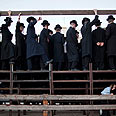
Haredim also want equality
Op-ed: Attacking haredim has turned into competitive sport on political and PR playing field
Once the social justice storms finally subside, the dictatorial regimes in many of the Arab countries disintegrate, and a solution is found for the doctors’ strike, the social agenda will inevitably revert to the haredi community. The ultra-Orthodox have always been a hot potato, of sorts.
Even President Shimon Peres dedicated a few words at the opening of the winter session of the Knesset to the theme of haredim. He eagerly challenged the ultra-Orthodox sector to expand its participation in the labor market, concurrently calling upon Israeli employers to open their gates to haredi employees, while respecting their needs and customs.
Lest the Supreme Court find itself idle, the Honorable Judge S. Jubran will soon adjudicate a petition to the High Court of Justice, regarding the question why a university student in Israel is not entitled to the same national insurance benefits awarded to a haredi man learning in kolel.
Various studies show that the haredi population in Israel is about 600,000 people. The total cost of the national insurance benefits provided by the State for this community adds up to approximately NIS 120 million – certainly a considerable sum. The total cost of higher education for the upcoming two years is estimated at NIS 1.3 billion. Additionally, in 2011 the government awarded, justifiably, NIS 1.5 billion for scholarships, bonuses and financial aid. Any discussion should keep these facts in mind.
The problem is that attacking the haredim has turned into a competitive sport on the political and PR playing field, making it very difficult to talk numbers. Although the total cost of national insurance benefits for haredim is tenfold less than the costs of higher education, the debate is not one of numbers or of just distribution. The challenge in clarifying the distinction between academic education and religious studies is a cultural one, deeply rooted and engrained.
A haredi person can understand the importance of the academic world, as well as the need to invest in secular studies - in addition to religious studies. And yes, he can also value the necessity of the IDF and our security forces for the security and safety of all of Israel’s citizens. At the same time, the average non-haredi finds it hard to comprehend why the study of Torah is the real fuel of the Jewish people.
Unparalleled haredi work ethic
I assume that in the petition served, inter alia, by university students and various non-Orthodox movements, we will hear about the differences between kolel men and university students, about the inner faith that demands the study of Torah to be a daily occupation, about religious studies not being a profession-oriented and often a short-lived and ephemeral training. We will also hear that a democratic country possesses the necessary tools, and is legally entitled, to provide discrete and tailor-made budgets for kolel students. Likely, we will also hear about the government’s concerted efforts to encourage the haredi community to move out of the sometimes vicious unemployment cycle, in order to battle poverty and to improve the growth potential of Israel’s economy.
I very much doubt, however, that the cultural angle will be part of the legal or public discussion. It is questionable whether the haredi community will be able to explain to the general public, to the media and to the legal system that, notwithstanding all the good will, to create a homogeneous, egalitarian society, the path to the change cannot be a revolutionary one; that it has to be an evolutionary, gradual process; that it cannot be imposed from the outside, but only through changes from within. Slow, controlled modifications, long-term thinking, and, most importantly, going with the flow and not against it, are the means for reducing the flames, and creating a fertile dialogue.
One paradigmatic example for gradual change and not a revolution: until recently, haredi women who sought employment worked almost exclusively in the educational field – as teachers or teachers’ assistants. Through strategic thinking, intensive dialogue, mutual respect and just distribution of resources, the government created incentives for companies employing haredi (and Arab) employees.
The government not only talks the talk, but also provides a monthly incentive of NIS 1,000 per employee, which is transferred to the employer, throughout an allotted term of 30 months. Through this program, 3,500 haredim have already joined the workforce. CityBook Services, like other high-tech companies, recognized the untapped potential of the haredi sector: unparalleled work ethic, devotion, seriousness, speed of learning, and more – and have predicated their business models by tapping into this sector.
It is the civic duty of our political and business leadership, media, and courts to become genuinely acquainted with culture and mores of the minorities in Israel - haredi and Arab alike. Each of these communities maintains a rich and multi-faceted cultural world. In any forthcoming discussions and debates regarding equality for haredim in Israel, our leadership, media and courts have an overarching responsibility to avoid unnecessary revolutionary tendencies, and to understand the predispositions and trends within the haredi community, when planning and executing a long-term strategic vision for this community.
Eli Kazhdan is the CEO of CityBook Services, employing 200 haredi women in Modiin Illit and Beitar Illit










